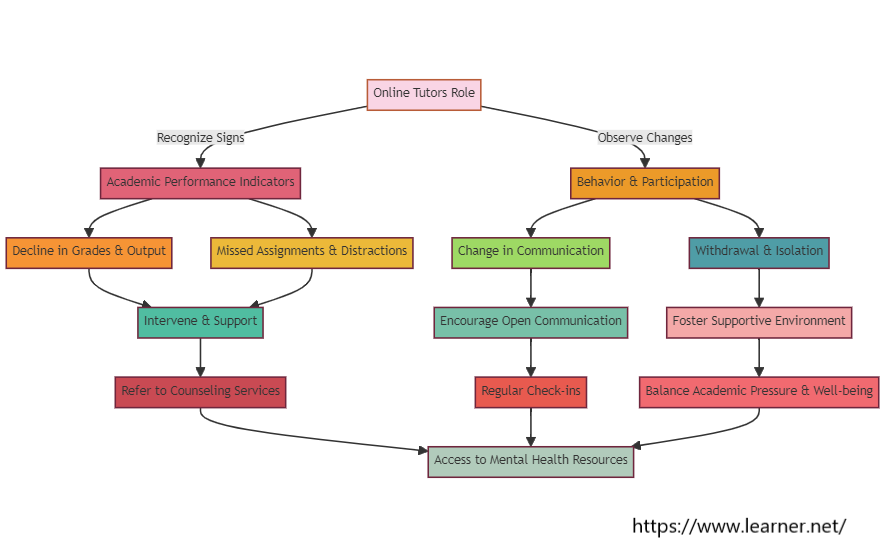The digital educational landscape has witnessed a profound transformation with the increasing adoption of distance learning, a trend further accelerated by the global shift toward online education platforms. As traditional classroom settings make room for digital academies and virtual classrooms, the need to recognize mental challenges in students has become increasingly prevalent.
In both online and traditional environments, the onset of mental issues among students poses a significant concern. The amalgamation of academic pressure, societal expectations, and the challenges of adapting to evolving learning formats has created a delicate balance that educators must navigate. Recognizing the signs of mental challenges in students is crucial, as it directly correlates with a student’s academic performance and overall well-being.
In traditional classroom settings, educators have historically been attuned to the behavioral nuances of their students. However, the paradigm shift to distance learning brings forth new challenges. The absence of face-to-face interactions makes it challenging to identify subtle changes in behavior or signs of distress that may manifest in a physical classroom setting. Online tutors, therefore, face the additional responsibility of honing their observational skills to detect early indications of mental health challenges in their students.
The significance of recognizing mental challenges extends beyond the academic realm. Mental health plays a pivotal role in shaping a student’s overall development and future success. Research indicates that students facing mental health issues may experience a decline in academic performance, increased absenteeism, and challenges in maintaining positive relationships with peers. Hence, a proactive approach to identifying and addressing mental challenges is imperative in fostering a conducive learning environment.
As the numbers of digital academies and online educational platforms continue to rise, the role of online tutors becomes increasingly crucial in safeguarding the well-being of students. Online tutors serve as the primary point of contact in the virtual learning environment, necessitating heightened vigilance in recognizing the onset of mental issues. The unique challenges posed by digital learning, such as screen fatigue and limited social interactions, underscore the need for online tutors to be adept at discerning signs of distress in their students.
The shift to distance learning has redefined the landscape of education, necessitating a comprehensive approach to recognizing and addressing mental challenges in students. This imperative holds true not only for traditional classroom settings but is amplified in the digital realm.
Online tutors, serving as the linchpin in the virtual learning environment, play a pivotal role in identifying the onset of mental issues among students. As the prevalence of digital academies and online education platforms continues to grow, the importance of online tutors in fostering a supportive and mentally healthy learning environment cannot be overstated.
Recognizing Early Signs Of Mental Concerns with Online Students
The mental health of online students takes center stage, requiring vigilant efforts to recognize early signs of concern. Distinctive changes in behavior and participation serve as crucial indicators that demand attention from educators and online tutors alike.
Identifying sudden or progressively detrimental changes in student behavior is a nuanced yet vital aspect of recognizing early signs of mental health challenges in online students. Observing shifts in demeanor, communication styles, and participation levels becomes something online educators should become attentive towards and keenly aware of in their teacher/student interactions. Any sudden departure from established patterns may signify underlying issues that warrant further exploration.
Decreased engagement in online sessions stands out as a pertinent red flag in the assessment of a student’s mental well-being. This phenomenon manifests through a decline in active participation, responsiveness, or the quality of contributions during virtual classes. Online tutors must remain attuned to these subtle shifts, understanding that diminished engagement may serve as an early marker of potential mental health challenges.
Additionally, the occurrence of sudden withdrawal or isolation demands careful consideration. Online learning environments, lacking the physical presence and social dynamics of traditional classrooms, amplify the potential for students to withdraw from interactions. A student who was previously active in discussions and collaborative activities may exhibit signs of isolation, choosing to disengage from peer interactions and educational discourse. Such behavior may point to underlying mental health concerns that require timely intervention.
To address these challenges effectively, online tutors should adopt a proactive stance. Establishing open communication channels with students becomes paramount in creating an environment where students feel comfortable expressing their concerns. Regular check-ins, both formal and informal, allow tutors to gauge the emotional well-being of students and identify any emerging challenges.
The significance of recognizing early signs of concern extends beyond academic considerations. Research indicates that prompt intervention in mental health matters positively influences overall student success. By being attentive to changes in behavior and participation, online tutors contribute to fostering a supportive and inclusive virtual learning environment.
The landscape of online education necessitates heightened awareness regarding the mental health of students engaged in distance learning. Recognizing early signs of concern involves a keen understanding of changes in behavior and participation. Online tutors play a pivotal role in identifying decreased engagement in online sessions and noting any sudden withdrawal or isolation exhibited by students. By fostering open communication and actively addressing emerging challenges, educators contribute to creating a resilient and mentally healthy online learning community.
Academic Performance Indicators of Mental Health Concerns for Online Students
International online tutors play a pivotal role in not only facilitating academic growth but also in recognizing academic performance indicators that may point to underlying mental health concerns among their students.
A steady decline in grades and academic output stands out as a prominent academic performance indicator that international online tutors need to be attuned to. This decline may often manifest itself beginning with a gradual decrease in the quality of assignments, assessments, or overall academic achievement. Online tutors should vigilantly monitor such patterns, recognizing that academic struggles can often be linked to mental health challenges.
Similarly, an increase in missed assignments or frequent distractions can serve as red flags in the assessment of a student’s mental well-being. Missed deadlines or a noticeable lack of focus during online sessions may indicate struggles beyond the academic realm. International online tutors must be discerning in identifying these behaviors and address them proactively to ensure that students receive the necessary support.
Verbal and audible indications of mental health issues present another layer of consideration for online tutors. Sudden alterations in communication patterns may be indicative of emotional distress or discomfort. Students who were once expressive may become reserved, while others might display a heightened emotional intensity in their interactions. International online tutors should pay close attention to these nuanced shifts in communication styles, recognizing them as potential signs of underlying mental health concerns.
Unusual expressions of distress or concern in written evaluations or other communications between online tutors and their students should not be overlooked. These expressions may manifest in the form of explicit statements, changes in tone, or the use of language indicative of emotional distress. Online tutors need to approach such communications with sensitivity, acknowledging the potential link between academic challenges and mental health issues.
International online tutors must be vigilant in recognizing academic performance indicators that may signal mental health concerns among their students. A decline in grades and academic output, an increase in missed assignments or distractions, as well as verbal and audible indications of distress, all warrant careful consideration. By fostering open communication and addressing academic challenges with empathy, online tutors contribute to creating a supportive virtual learning environment that prioritizes the mental well-being of students.
Diagram 1: Mental Wellness in Digital Classrooms: Navigating Challenges and Solutions

Understanding the Impact of Distance Learning
Understanding the impact of distance learning goes beyond the virtual classroom, delving into the nuanced dynamics that influence the mental well-being of both online tutors and their students. One crucial facet of this impact is the pervasive isolation and lack of social interaction experienced by many students engaged in distance learning. While introverts may actually thrive in the digital age, the majority of online students will be susceptible to certain issues that merit attention, if not concern from their tutors.
The absence of physical classrooms and face-to-face interactions often leads to a sense of isolation among online students. The traditional camaraderie of the classroom is replaced by virtual spaces, which, though convenient, may lack the depth and nuance of a personal connection. International online tutors, recognizing the potential loneliness their students may face, must actively foster a supportive online environment that encourages interaction and collaboration among students.
Screen fatigue, a phenomenon exacerbated by the prolonged use of digital devices for learning, poses another significant concern. The constant exposure to screens during virtual classes and study sessions can lead to mental exhaustion and physical strain. Both online tutors and students need to be aware of the potential detrimental effects of screen fatigue on mental health especially when either one may be spending an inordinately length of time in front of their computers or other devices. Implementing strategies such as regular breaks, eye exercises, and mindfulness techniques can help alleviate the impact of excessive screen time.
Balancing academic pressure and personal well-being emerges as a critical consideration in the context of distance learning. The flexibility offered by online education can sometimes blur the boundaries between academic and personal life, leading to an increased sense of pressure and burnout. Online tutors play a crucial role in guiding students to strike a balance, emphasizing the importance of self-care and stress management alongside academic pursuits.
Moreover, the mental well-being of online tutors themselves is not to be overlooked. The shift to online teaching brings its own set of challenges, and tutors may experience increased stress and fatigue. Acknowledging the impact of these stressors is essential for fostering a healthy online learning environment. Providing resources for self-care and encouraging a collaborative approach among tutors can contribute to a more resilient online teaching community.
Understanding the impact of distance learning requires a multifaceted approach that addresses the isolation and lack of social interaction experienced by students, recognizes the potential detrimental effects of screen fatigue, and underscores the importance of balancing academic pressure with personal well-being. Online tutors, as facilitators of this digital educational landscape, play a central role in shaping a positive and supportive learning environment that prioritizes the mental health of both students and educators.
Strategies for Online Tutors to Reduce Student Mental Health Concerns
Online tutors play a pivotal role not only in facilitating academic growth but also in mitigating the potential detrimental effects of this mode of learning on student mental health. Implementing strategic approaches is crucial to fostering a supportive online environment that prioritizes the well-being of students.
Digital education, while offering unprecedented flexibility and accessibility for students from around the world, brings forth challenges that can still impact student mental health despite the many added benefits of online education. Online tutors must proactively adopt strategies to address these challenges, recognizing the importance of creating an environment that nurtures both academic and emotional growth.
A fundamental strategy for online tutors is the establishment of open communication channels with students. Creating an atmosphere where students feel comfortable expressing concerns is essential in addressing potential mental health challenges.
Online tutors should encourage students to voice their thoughts, questions, and struggles, fostering a sense of trust and collaboration in the virtual learning space. By proactively addressing communication barriers, tutors contribute to the creation of an environment where mental health concerns can be identified and addressed promptly.
The online learning environment should be intentionally crafted to be supportive and inclusive. Tutors can utilize various tools such as the Learner Net AI Assistants and even other educational platforms to facilitate collaborative learning, encouraging peer interactions and engagement.
Fostered relationships within the virtual classroom can serve as a buffer against the isolation often associated with digital education. Additionally, tutors should be mindful of the tone and language used in communications, promoting a positive and encouraging atmosphere that uplifts students’ spirits. A supportive online environment not only enhances academic outcomes but also contributes to the overall well-being of students.
Regular check-ins with students are a proactive strategy to monitor their well-being and academic progress. Online tutors should schedule periodic one-on-one sessions, providing a dedicated space for students to discuss any challenges they may be facing.
These check-ins go beyond academic concerns, allowing tutors to gauge the emotional state of students. Recognizing signs of distress or disengagement early on enables timely intervention, preventing the escalation of mental health issues. Consistent and scheduled check-ins also reinforce the idea that online tutors are invested in the holistic development of their students.
Strategies for online tutors to reduce the detrimental effects of digital education on student mental health requires a multifaceted and continual approach. By establishing open communication channels, creating a supportive online environment, and encouraging regular check-ins, tutors contribute to fostering a virtual learning space that prioritizes the emotional well-being of students. These proactive measures not only enhance the overall learning experience but also mitigate the potential negative impacts associated with the digital education landscape.
Identifying Resources for Additional Support
The importance of identifying resources for additional support is exceptionally beneficial in ensuring the mental well-being of students online. Online tutors, serving as key figures in the virtual learning environment, play a crucial role in connecting students with the necessary resources for mental health support.
As the digital educational landscape continues to evolve, the need for robust mental health support mechanisms will become increasingly evident. Identifying resources for additional support is integral to creating a comprehensive support system that addresses the diverse needs of students engaged in online learning.
One potential strategy for online tutors is the ability to refer students to counseling services. Recognizing signs of mental health challenges, tutors should be adept at suggesting and facilitating access to professional counseling. Many educational institutions and online platforms offer counseling services, either in-house or through partnerships with external organizations. Tutors can play a pivotal role in de-stigmatizing seeking mental health assistance, emphasizing its role in promoting overall well-being.
Equipping online students with the knowledge and resources to provide additional information on mental health support services is equally crucial. Tutors should be well-versed in available resources, including hotlines, crisis intervention services, and mental health websites.
By arming tutors with this information, students gain access to a spectrum of support beyond traditional counseling. There may be a great many cases where the students are unwilling to discuss such matters within the confines of their educational environment or in the digital classroom, though they may still desire to find the help they require in order to ensure they can maintain a solid basis for mental health support.
The online tutor always has an option to include this material in their promotional materials, or other locations wherein the student can have more discreet access to the information about mental health support. This approach ensures that students can choose the resources that align with their comfort levels and preferences without being forced into the uncomfortable position of admitting their faults in group settings or with others they may rely on in other ways.
An innovative approach to addressing mental health concerns is the potential inclusion of materials within additional areas that are readily accessible to students. Online platforms and learning management systems can incorporate dedicated sections with information on mental health resources.
This approach provides a discreet avenue for students who may be hesitant to openly seek support. By having these materials readily available, students can access information and assistance confidentially, fostering a culture of self-care and well-being.
The importance of identifying multiple resources for additional support in the realm of online education cannot be overstated. Online tutors, serving as the frontline of student support, possess the ability to refer students to counseling services, provide additional information on mental health resources, and advocate for the inclusion of materials in student-accessible areas.
These proactive measures contribute to the creation of a supportive virtual learning environment that prioritizes the mental health of students, recognizing the diverse needs and preferences of the digital learning community.
Challenges Faced by Parents and Online Tutors
Both parents and online tutors may also face a myriad of challenges as they navigate the complexities of facilitating distance learning for students. The intricate dance between multiple responsibilities, coupled with parental struggles and potential emotional toll on online tutors, underscores the need for effective strategies to address these challenges.
As online education and even remote working for parents continues to grow and expand, even the parents and online tutors can find themselves at the deeply ensconced within the digital learning experience. Balancing numerous responsibilities and addressing the unique struggles inherent in facilitating distance learning will pose significant challenges for parents and tutors, not just for students.
One of the primary challenges faced by both parents and online tutors is the intricate balancing act of multiple responsibilities.
Parents are often juggling work commitments and household responsibilities, find themselves thrust into the role of facilitators for their children’s education. Similarly, online tutors, especially those that are new to the field, must also navigate the demands of supporting diverse students while managing their own professional and personal obligations. The delicate balance required to meet these multifaceted responsibilities calls for a strategic and adaptable approach.
Some parents will grapple with the technical aspects of online platforms and the educational tools used in virtual classrooms. Additionally, the absence of direct supervision inherent in traditional classrooms places the onus on parents to ensure their children remain engaged and focused during online sessions.
Parents must navigate these challenges while providing emotional support and fostering a conducive learning environment at home. This can be especially challenging for parents who, like their children, have now discovered the opportunities or in some cases, been forced to engage in remote work. The requirements to maintain their work ethics and productive standards, without the benefit of a boss or peers on site, and with an online student at home at the same time, can create more than just a little stress.
Resolving these parental struggles necessitates collaboration between parents, educators, and the digital educational institutions. Offering comprehensive training sessions for parents on virtual learning tools and strategies can enhance their ability to support their children effectively. Clear communication channels between parents and online tutors are also vital to address concerns and provide timely feedback, fostering a collaborative approach to distance learning.
The potential emotional toll on online tutors is an often-overlooked aspect of digital education. Online tutors, while dedicated to facilitating learning, may experience increased stress, emotional fatigue, and burnout. The virtual nature of their interactions with students can create a sense of isolation, and the challenges of adapting to diverse learning needs, combined in an increasing number of cases, with people unfamiliar with the “work-from-home” environment can further compound this emotional toll.
Options to mitigate the emotional toll on online tutors include fostering a sense of community among educators through regular virtual meetings and peer support forums such as through the group chats and peer-group activities for online tutors encouraged and supported by Learner Net. There is always going to be at least some understanding, if not support, among peers within any industry, and the ability to actively engage in social discourse with other online tutors can be more beneficial than some individuals may otherwise expect.
Educational institutions like Learner Net, prioritize mental health resources for online tutors, parents, and students, offering counseling services and professional development opportunities to enhance coping mechanisms. Acknowledging the emotional challenges and providing a supportive infrastructure can contribute to the overall well-being of online tutors, parents, and students.
Balancing multiple responsibilities, addressing parental struggles in facilitating distance learning, and mitigating the potential emotional toll on online tutors require collaborative efforts, training programs, and dedicated support structures. By recognizing and proactively addressing these challenges, the educational community can create an environment that fosters effective and sustainable online learning experiences.
Collaborative Approach for Support
Establishing a collaborative approach for support involving professional online tutors and parents is key to successfully addressing issues concerning mental health and well being in digital education. This collaborative model not only benefits students but also enhances the overall effectiveness of the digital learning experience.
Strengthening communication between parents and tutors is a key component of this approach, fostering a mutual understanding of challenges and providing essential support services even when students may be reluctant to accept such assistance.
A collaborative approach involving professional online tutors and parents is crucial for the holistic development of students engaged in digital learning. By extending the support network beyond the virtual classroom and into the student’s home environment, a unified front is established to address academic and emotional challenges for the students.
Strengthening communication between parents and tutors should yield a host of benefits. It establishes a channel for sharing insights into the student’s learning style, strengths, and areas of improvement. Regular communication allows parents to stay informed about their child’s progress, ensuring they can provide supplementary support at home. Additionally, tutors gain valuable insights into the student’s home environment, enabling them to tailor their approach to meet the student’s specific needs.
A mutual understanding of the challenges being faced by the student is a direct outcome of enhanced communication. Tutors and parents can collaborate to identify areas of difficulty, whether academic or emotional, and develop strategies for effective interventions. This shared understanding builds a cohesive support system that addresses challenges comprehensively, promoting the student’s success in the digital learning environment.
Collaborative communication also enables the provision of necessary support services to students who may be hesitant to accept such assistance. Tutors, in collaboration with parents, can identify signs of academic struggle or emotional distress that may go unnoticed by the student. By coordinating efforts, tutors and parents can ensure timely access to additional resources such as counseling services, specialized tutoring, or academic accommodations.
Knowing when to step in is a delicate aspect of the collaborative approach. Tutors and parents must be attuned to signs that indicate a student may require additional support. Changes in academic performance, behavioral shifts, or expressions of emotional distress may signal the need for intervention. A collaborative approach ensures that both tutors and parents are vigilant in monitoring these signs and can collectively determine the appropriate course of action.
The risks of being wrong in identifying mental health concerns are inherent in a singular approach, but greatly reduced in a more collaborative approach. Parents and tutors may be under duress individually, projecting concerns onto the student that may not accurately reflect the student’s mental state. Open and transparent communication becomes paramount in addressing these risks. Regular check-ins, sharing observations, and seeking professional guidance when in doubt are essential components of mitigating the risks associated with potential misinterpretations. These are especially helpful in terms of a more cooperative effort by and between the parents and the tutors.
The collaborative approach involving professional online tutors and parents is integral to the success of students in the digital learning landscape. Strengthening communication between these stakeholders fosters a mutual understanding of challenges, enables the provision of necessary support services, and facilitates timely intervention when needed. While knowing when to step in is crucial, acknowledging the risks of being wrong underscores the importance of maintaining transparent and open channels of communication in the best interest of the student.








There are no reviews yet.